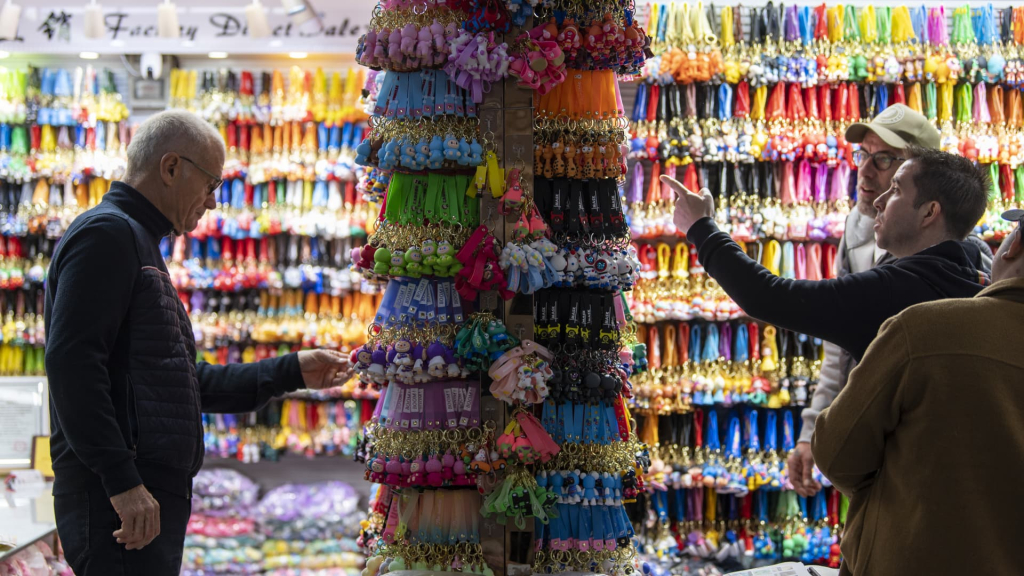Retailers in the United States have been experiencing an increasing trend known as “Christmas creep,” where holiday merchandise begins appearing on store shelves earlier each year, aiming to take advantage of the booming holiday shopping season.
However, the implementation of tariffs could pose significant challenges to this festive shopping surge, as factories in China and their U.S. partners navigate the uncertain landscape of import tariffs, striving to ensure ample stock for the Christmas season.
In April, following the announcement of extensive tariffs by U.S. President Donald Trump — which included a staggering increase from 34% to 145% on imports from China — many U.S. retailers reportedly ceased orders from Chinese manufacturers, leading to a halt in production at these facilities, according to insights shared in Finance Newso interviews.
Recent reports indicate, however, that some production activities have resumed as fears of business interruptions and lost sales opportunities begin to outweigh apprehensions about tariff volatility. Cameron Johnson, a senior partner at Tidalwave Solutions based in Shanghai, emphasized the urgency of the situation in a phone interview, noting, “If you don’t start producing in the next couple of weeks, you’re going to start missing Black Friday and Christmas.”
Johnson added that both U.S. retailers and Chinese manufacturers are displaying adaptability. “Retailers are beginning to understand that halting these supply chains could lead to far greater complications in restarting them later,” he remarked.
Johnson further elaborated on the cascading effects of halted orders, explaining that a disruption in the production of spoons could adversely affect the steel rolling mills and iron ore smelters. “These upstream supply chains are also beginning to shut down, and if they do, even if there is a resolution, it will take time to restart production,” he said.
Despite attempts to reroute goods made in China through alternative markets, establishing new supply chains and shipping schedules is no small feat. Goldman Sachs recently reported that for 36% of U.S. imports from China, over 70% of these products can only be sourced from mainland suppliers.
Renaud Anjoran, CEO of Agilian Technology, an electronics manufacturer in China, highlighted the logistics timeline, explaining that electronics must be shipped from China by early September to ensure their availability in U.S. stores after the Thanksgiving holiday. He emphasized that the manufacturing process typically requires around six months, meaning suppliers should have commenced preparations for these orders as early as March.
Shrinking shipments
As the anticipation of higher tariffs loomed after Trump’s reelection, many U.S. buyers began stockpiling inventories late last year. This strategy led to a reported 9.1% increase in China’s exports to the U.S. in March compared to the previous year, while U.S. imports from China saw a decline of 9.5%. Upcoming trade figures for April are expected to be published on May 9.
However, those preemptive stockpiling efforts have started to diminish. Recent tracking by Morgan Stanley indicates a significant decrease in cargo ships traveling from China to the U.S., coupled with a drastic 14-fold increase in cancelled shipments from April 14 to May 5 compared to the preceding month.
Moreover, a recent report from China’s national statistics bureau revealed that new export orders from Chinese factories dropped to their lowest levels since late 2022.
“At this time, we do not have many purchase orders lined up for the upcoming months from American clients,” Anjoran stated, observing that most of his clients had already secured inventory dispatched to the U.S. prior to the Chinese New Year at the end of January, with minimal orders trickling in during March and April.
Some U.S. buyers are adopting a wait-and-see approach concerning potential tariff reductions expected in May before proceeding with orders. Ryan Zhao, a director at Jiangsu Green Willow Textile, indicated that the company has currently paused production for its U.S. clients pending clarity on tariff adjustments.
There have been reports indicating some minor tariff relief as both governments aim to mitigate the economic repercussions of punitive tariffs. Reports claim China has provided tariff exemptions for specific U.S. imports, including pharmaceuticals, aerospace equipment, semiconductors, and ethane.
Additionally, President Trump recently signed an executive order that exempts foreign automotive products from further tariffs, following a prior rollback on tariffs affecting a range of electronic goods, such as smartphones and computers.
Trying to time it right
Amidst concerns regarding profit margins, some businesses are attempting to strategically replenish their orders from China rather than risk empty inventory on store shelves, according to Johnson from Tidalwave Solutions.
Marti Crowley, vice president of product development at Toysmith — a wholesale toy distributor based in Seattle — noted in an email that some U.S. importers have requested factories to resume production in anticipation of potential tariff relief. The company’s website encourages customers to place orders by May 16 for shipping by July 31 to “lock in current, non-tariffed pricing.”
In recent days, numerous factories located in manufacturing hubs such as Yiwu, Shantou, and Dongguan have received approval to restart production from major retailers like Walmart and Target. However, the requests for comment from these retailers went unanswered.
Some Agilian customers are also making smaller orders, betting that tariff rates will decline by the time their shipments reach U.S. ports.
Nevertheless, a breakthrough in U.S.-China trade discussions could lead to a surge in order backfill, potentially causing increased production and shipping costs if factories are overwhelmed. “It is feasible to expedite production for smaller quantities; however, if American customers flood orders simultaneously, production capabilities could be strained, leading to high air freight costs,” Anjoran cautioned.


























